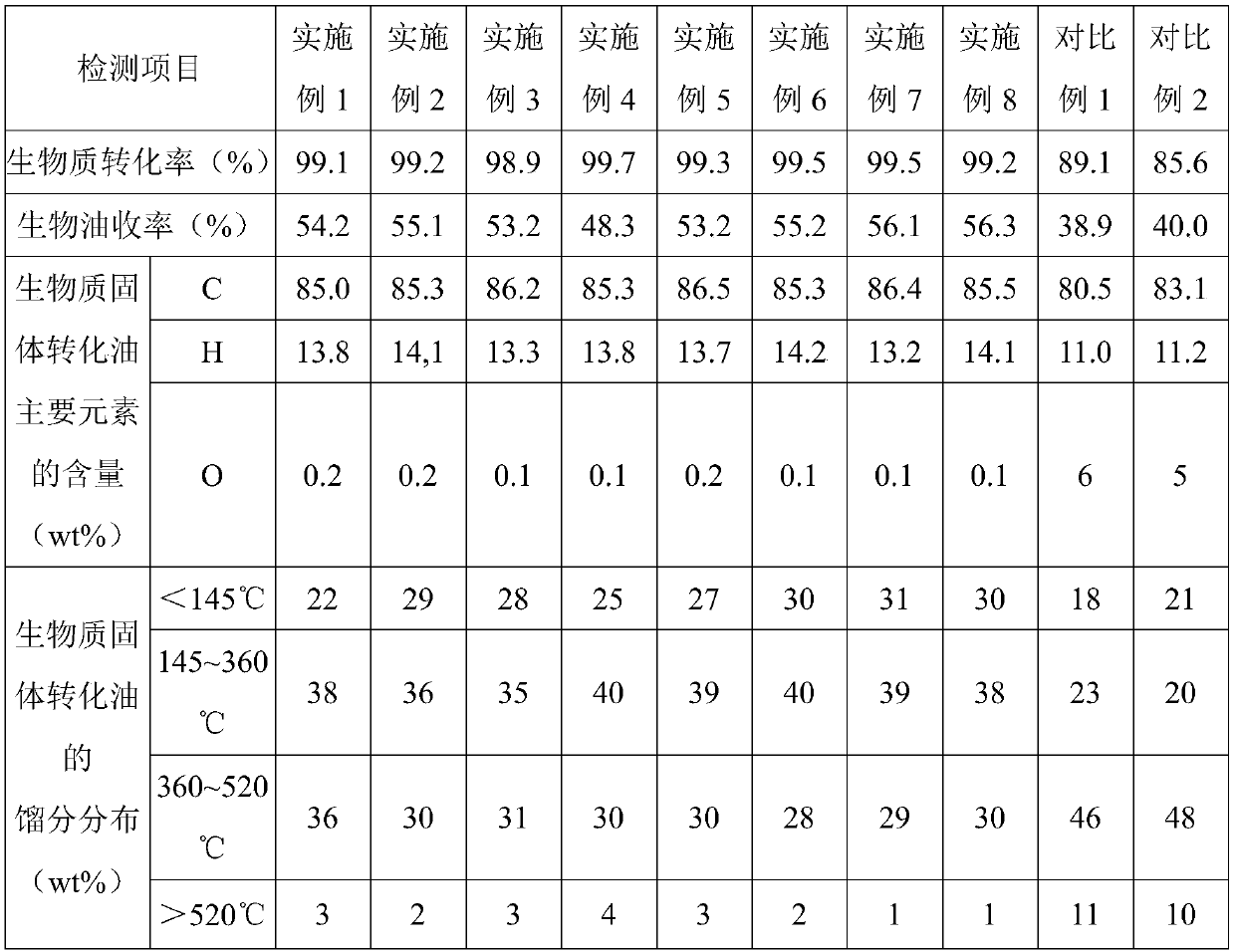Two-stage conversion refining technology for biomass
A biomass and process technology, which is applied in the field of two-stage conversion and refining process of biomass, can solve the problems of large amount of waste water, low calorific value of oil products, and low yield of liquefied oil.
- Summary
- Abstract
- Description
- Claims
- Application Information
AI Technical Summary
Problems solved by technology
Method used
Image
Examples
Embodiment 1
[0102] This embodiment provides a biomass two-stage conversion refining process, including the following steps:
[0103] Iron catalyst:
[0104] The iron-based catalyst is a waste agent of a desulfurizer with iron oxide as an active component, wherein, in the desulfurizer with iron oxide as an active component, 10g of calcium bicarbonate, 12g of basic copper carbonate, γ-Fe 2 o 3 18g, MnO 2 is 8g, NiO is 5g;
[0105] The desulfurization process of the above-mentioned desulfurizer with iron oxide as the active component is summarized as follows:
[0106] 1) Collect the tail gas produced by the fixed bed hydrogenation catalysis of medium and low temperature coal tar;
[0107] 2) The desulfurizing agent of this embodiment is made into columnar catalyst particles with a diameter of 1 mm and a length of 15 mm, and filled in the desulfurization tower to form a desulfurization layer;
[0108] 3) The above-mentioned tail gas is used for 2000h -1 The space velocity passes throu...
Embodiment 2
[0127] This embodiment provides a biomass two-stage conversion refining process, including the following steps:
[0128] Iron catalyst:
[0129] The iron-based catalyst is amorphous FeOOH; add sulfur: add solid sulfur powder to the above-mentioned iron-based catalyst until the molar ratio of iron to sulfur is 1:2, so as to ensure that the molar ratio of iron to sulfur in the reaction system is 1:2;
[0130] Preparation of slurry:
[0131] (1) collecting corn stalks, the water content of which is 5-20wt%, and then pulverizing them to a particle size of 0.2-5 cm with an ultrafine pulverizer;
[0132] (2) Compress the straw crushed in step (1) with a plodder, the compression pressure is 2.5MPa, the compression temperature is 45°C, and compressed to a true density of 1.0kg / m 3 ;
[0133] (3) crushing the straw compressed and molded in step (2) again with an airflow mill until the particle size is 0.1-500 microns to obtain straw powder;
[0134](4) Mix 80 kg of waste lubric...
Embodiment 3
[0147] This embodiment provides a biomass two-stage conversion refining process, including the following steps:
[0148] Iron catalyst:
[0149] The iron-based catalyst is the regeneration of the waste agent of the desulfurizer with iron oxyhydroxide as the active component, wherein, based on the total mass of the desulfurizer with iron oxyhydroxide as the active component, α-FeOOH is 30g, and the amorphous oxyhydroxide is oxidized 20g of iron, 8g of potassium oxide, 10g of binder kaolin;
[0150] The above-mentioned desulfurizer with iron oxyhydroxide as the active component is used for the desulfurization process of the tail gas produced after the hydrogenation and upgrading of medium and low temperature coal tar in industry as follows:
[0151] 1) Collect the tail gas produced by the fixed bed hydrogenation catalysis of medium and low temperature coal tar;
[0152] 2) The desulfurizing agent of this embodiment is made into columnar catalyst particles with a diameter of 1...
PUM
| Property | Measurement | Unit |
|---|---|---|
| particle size | aaaaa | aaaaa |
| particle diameter | aaaaa | aaaaa |
| particle diameter | aaaaa | aaaaa |
Abstract
Description
Claims
Application Information
 Login to View More
Login to View More - R&D
- Intellectual Property
- Life Sciences
- Materials
- Tech Scout
- Unparalleled Data Quality
- Higher Quality Content
- 60% Fewer Hallucinations
Browse by: Latest US Patents, China's latest patents, Technical Efficacy Thesaurus, Application Domain, Technology Topic, Popular Technical Reports.
© 2025 PatSnap. All rights reserved.Legal|Privacy policy|Modern Slavery Act Transparency Statement|Sitemap|About US| Contact US: help@patsnap.com

